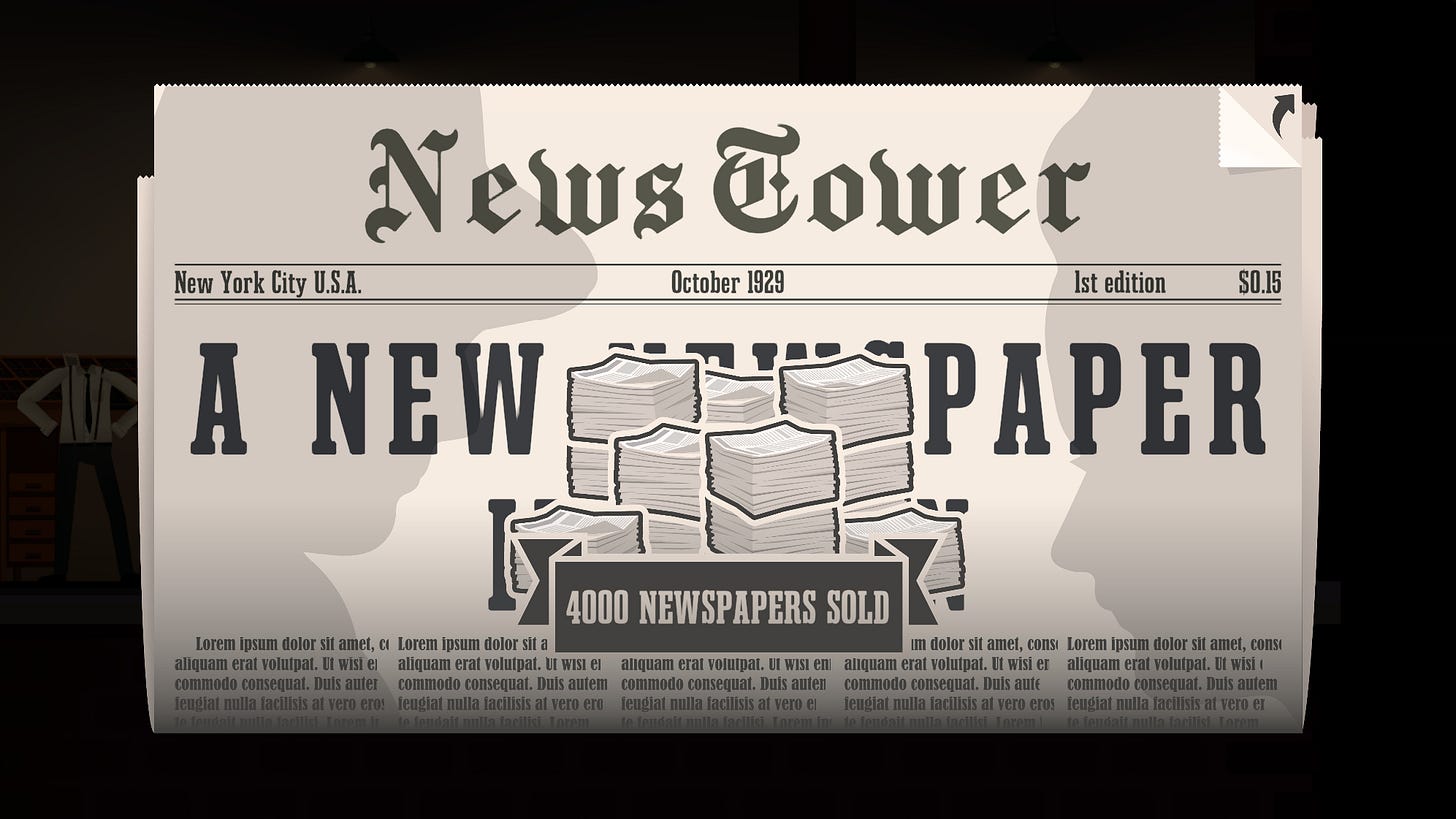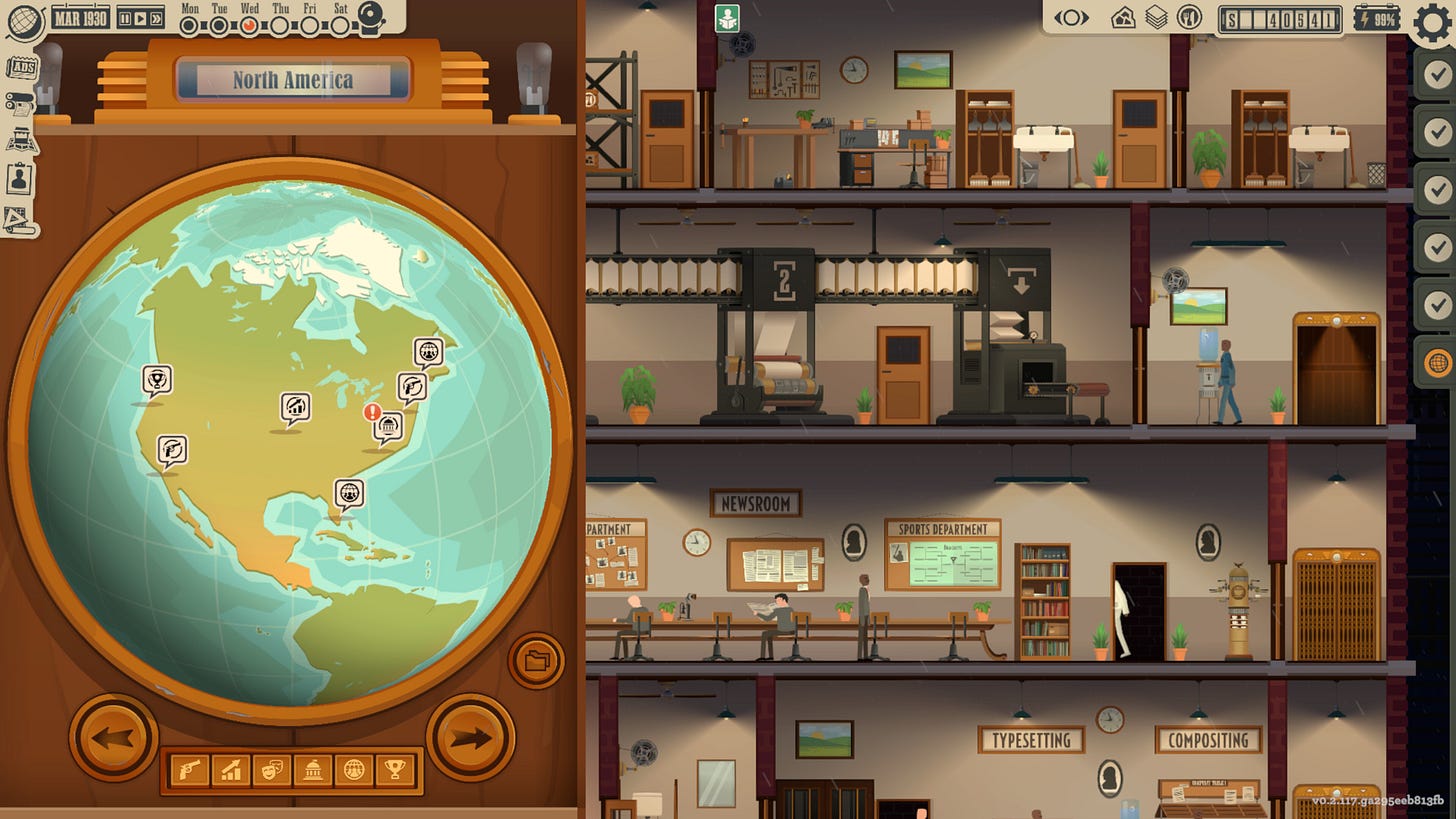News Tower: the push and pull of truth vs. profit
Publishing a newspaper is a stressful business at the best of times – but this news tycoon game explores what makes it so valuable and exhilarating
It won’t be news to anybody that media business models are fracturing. Between the disruption of revenue models, a proliferation of competition for audiences, and the denigration of the press by politicians, it’s been a bad few years for news companies.
But it’s still an aspirational business. The mission of keeping the public informed has arguably never been more important than now. There are still journalists doggedly pursuing stories that protect communities, both global and local. And there are the occasional embers among the spent ash of newspapers that suggest they may yet return – in a different but no less influential form.
That combination of a vital mission and a challenging economic situation lies behind News Tower’s appeal. A tycoon game set in 1930s New York, the simulation challenges you to rebuild a newspaper from the ground up.
As you do, you’ll have to navigate many of the challenges of the real news business, threading the needle between editorial and commercial considerations.
Jan-Maarten Nachtegeller is founder of News Tower developer Sparrow Night. Though based in Rotterdam, he explains that some of the inspiration for the game came from watching the relationship between press and public in the run-up to the 2016 elections in the US: “Around the time I initially thought of it, we had Trump rising and ‘Fake News’ was the big thing.
“Also in Holland, you had people who are very critical of the national news. So I thought, what would really give this extra element to the game would be to show to the player that yes, you are a company and you will have the financial side [but] you have the moral side. You have all these parties, pulling on you, trying to tell your story.”
That is reflected in-game by the pressure placed on your newspaper by powerful parties, who offer or refuse patronage based on the stories you pursue. In my game, for instance, The Curb (which I maintain is the Platonic ideal of a local newspaper name) ran afoul of the mafia, who were not shy about smashing my press and offices.
I could have, variously, given those stories less prominence in the layout, or sent my reporters to different stories entirely. There would, perhaps, have been a sounder financial reward for turning a blind eye to corruption. But the game ably incentivises both approaches, making the decisions you have to make feel weighty and momentous.
That extends to the minutiae of running a business, too. As with all good tycoon games, much of the challenge lies in balancing books, meeting the needs of your staff, and expanding into new locations. Early on I struggled to keep the staff in my dispatches office happy, because the need to buy a larger printing press took precedence over their need for extra lighting.
Everything is a trade-off – and while the game explains that all in a very intuitive manner, Nachtegeller says the behind-the-scenes logic is extremely complex. However, he believes that the emergent complexity and relationship between the game’s different systems are ultimately what attracts a lot of people to it:
“[We asked] how can we mould these things so that they are fun and understandable? I'm on the forums now because we have so many new players, lots of opinions, and it's really interesting to see [where people connect] with it.”
“The reason why I think it's a game that can stand out a bit is because it isn't easy to create. It's not a viral game. No, it’s a pretty complex system that you need to build. That takes time.”
History repeats
Nachtegeller says that the decision to set the game in the 1930s was a result of wanting to explore issues around the role of the press without making it so explicitly tied to modern-day events. Instead, the topics of the stories you’ll investigate are analogous to some of the considerations facing a modern newsroom:
“You had prohibition, you had the Great Depression. You had the Dust Bowl. You had, of course, the rise of fascism.
“At the same time, that was also the height of the newspaper, right? There were US companies that had their own planes… that would make five editions a day. I always thought that felt like the pinnacle moment for news.”
Despite the subject material, Nachtegeller and team found that it was important to develop a game that would appeal to a wide variety of gamers. Some, Nachtegeller says, approach the title as a purely stats-based game, in which maximising the return on every investment is paramount. Others, he says, play it as “cosy” game, regularly scrolling up past the top of the initial news building to watch the charmingly animated New York change in the background.
He says that the latter cohort took the team by surprise: “What we’ve found out now a bit is that quite a lot of people think of it as a cosy game. Of course the graphics are a bit light… and we always thought ‘okay, yes, graphic-wise we like Two Point Hospital. Because of the time limit and the stress of that we never really thought of it as being really cosy. But still people tend to gravitate towards that.”
In my time with the game I felt like its complexity of systems and constant push-and-pull of truth vs. power really resonated. There is, honestly, no way that any tycoon simulation could ever truly explore all aspects of the businesses and sectors they invoke.
But by focusing on the issues that plague the newspaper industry today and recreating them in a beautifully-realised 1930s world, the News Tower team have made something special: a tycoon game that is relevant and inclusive, evocative of real-world issues but fun to play.
News Tycoon is available in Early Access on Steam. Please don’t call your newspaper The Curb, though – that’s my name.



